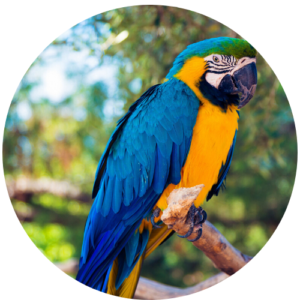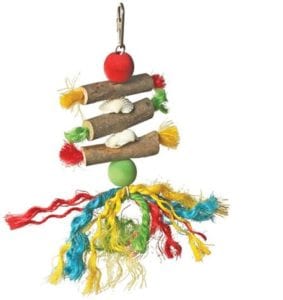
- FOOD AND WATER In the wild most parrots eat a mixture of fresh seeds and grasses, insects, flowers and fruits. Seed on its own is not the best diet for your parrot. It doesn’t contain many of the major vitamins and minerals that your bird needs to maintain good health. Offer your bird a good range of foods while it is young and still developing its tastes. Lorikeets and other honeyeaters have special food requirements, and there is a separate information sheet for them. The easiest way to feed a balanced diet is to use the pelleted or crumbled prepared foods that are now available. These are foods designed to contain all the vitamins and minerals your bird needs. Your bird is also less likely to become obese if you are using them. Introducing birds to these diets must be done carefully as it takes a while for some birds to recognise them as food. If you cannot use these diets, then you should try to feed no more than 50% of the diet as seed. Try to get your bird to eat plenty of fresh vegetables and fruits. Green leafy vegetables are good sources of Vitamin A, which is particularly lacking in seeds. Frozen vegetables are not as good as fresh ones but can be useful if you are too busy to prepare fresh food. The only fresh foods to avoid are rhubarb and avocado, which are both potentially toxic. Lettuce has a very high water content and doesn’t have much nutritional value. Overfeeding with cauliflower and broccoli can bind up the iodine in a bird’s body causing goitre. Also, some foods can be used as entertainment – corn on cob, peanuts in shell etc. Most human foods (such as cereals, pasta and cheese) can be fed in moderation. You can make special treats for your bird, such as fruitcakes and muffins. Do not give your birds salty foods, fatty foods, chocolate or alcohol. The birds have a much smaller body mass than we do, and these foods can be toxic to them even in small amounts.Water should be fresh and clean. Change your bird’s water daily. Try to avoid using vitamins and minerals in the water as this can increase the number of bacteria in water very quickly.
- EXERCISE Confining birds to a small cage for their whole lives is not acceptable. Ideally, birds should be allowed free flight out of the cage every day but under supervision. Most parrots quickly learn to navigate around the house so ensure all windows are closed. The largest cage possible is the best one to use. Cages that are longer are better than taller ones. Having a good supply of “cage furniture” helps keeps birds active eg. ladders, chains and swings. Many people have two cages, a smaller indoor cage for evening and night use and a larger outdoor cage or aviary for day use. Birds’ feet need to be exercised too and the best way to do this is to throw away the dowel perches provided with your cage and replace them with natural gumtree branches of varying thickness. If the birds chew them then just replace them as needed. Sandpaper covered perches are extremely bad for birds’ feet, being the equivalent of walking barefoot on broken glass.
- ENTERTAINMENT Parrots are intelligent, playful and curious creatures. Their intelligence level has been compared to that of a four-year-old human. Most of them are highly social animals and quickly become bored and
withdrawn if they are not stimulated. It is good for your bird to have a special time every day when they can play with you, even if it is only for 10-15 minutes. For the rest of the time providing toys can help keep them lively and active. It is better to only provide a few toys at a time and rotate them, rather than to crowd the cage. There are four main types of toys; climbing (chains, gym sets, ropes and ladders), chewing (branches, bones, leather, nuts and pinecones), puzzles and play items (balls, bells and small fluffy objects). Toys should be carefully checked for dangerous metal parts. See the section on Hazards. If you are often absent then leaving a radio tuned to a news station can provide some diversion. Other birds appear to enjoy music. For most birds the best stimulation will be your company. If you cannot devote good time for your bird then consider getting them a mate for company.
- HANDLING The most rewarding birds to handle are those that have been hand-raised as they have no fear of humans. They should be fully weaned before they are sold. These birds should be handled from the time you get them and they will enjoy being with you. Don’t take any bird outdoors unrestrained even if their wings are clipped. Parent raised birds can be tamed and the younger the birds are when this is done the better. They are initially afraid of people and must be gently taught to overcome this. Positive reinforcement using food treats and affection should be used to gradually win their confidence. Don’t try to accomplish too much with each lesson. Placing their cage so the birds are perching at your chest height will lessen their feelings of vulnerability. Birds can be trained. Set them rules and be consistent. If they are naughty then confining them to their cage (sin bin/time out) and covering them for 10-20 minutes can be a suitable punishment. If you are afraid of being bitten then pick them up in a towel or cloth and quickly transfer them to the cage.
- HEALTH CARE It is recommended that every new bird be taken your local bird vet for a “New Bird Check”. This will enable the vet to detect any potential problems, which may not be obvious to you. The most common infectious disease seen in new parrots is Chlamydiosis (Psittacosis). This serious disease can be fatal to parrots and can be transmitted to people. If you have other birds it is best to keep the new bird “in quarantine” and away from them for at least four weeks. Birds should be wormed when you first get them and then at least twice a year. If they are kept with other birds, in an aviary, worming will be needed more regularly. If your birds have mites or lice this can be treated with a pyrethrin spray applied once a week for three weeks. Don’t treat your birds unless they need it. Keeping birds happy and stress free is the best way to keep them healthy.
- HYGIENE The other important factor in stopping your bird getting ill is to keep its cage and food and water bowls clean. All feed and water bowls should be cleaned with detergent at least once a week and the cage floor cleaned weekly as well. The cage floor should be covered with either sand or newspaper and droppings should be removed regularly. Don’t let them form stalagmites! Perches and toys should be cleaned regularly and replaced when they become too soiled.
- SIGNS OF ILLNESS Birds can hide the signs of illness until disease is quite far advanced so it is important to be aware of the early signs of illness. These include:
-
- Sneezing, coughing or stained/blocked nostrils
- Inflamed, swollen or weeping eyes
- Stained vent (bottom) or droppings caught in feathers near vent
- Vomiting
- Diarrhoea or colour change to the droppings
- Drinking lots of water
- Depression, quietness or sleepiness
- Fluffed up appearance
- Sitting on floor, reluctant to move
- Poor quality, discoloured or brittle feathers
- Any of these signs can indicate illness and a bird vet should be consulted.
- POTENTIAL HOUSEHOLD HAZARDS There are a surprising number of hazards in most homes and a bird’s tendency to explore the world by tasting it exposes them to many dangers. Also, birds have a much more efficient breathing system than we do that makes them very susceptible to airborne toxins.
-
- Heavy metals (Lead, zinc and copper) These metals are toxic to the bird’s nervous system and can be found in the galvanising on wire, electrical wires, curtain weights and line, fishing sinkers, toys, old paint and marine paint, window putty, batteries, solder, linoleum, stained glass linings and plaster.
- Household plants Toxic plants are thankfully rare. Some plants known to be toxic include avocado, black locust, Clematis, Diffenbachia, Foxglove, Lily of the Valley, Crown vetch, Oleander, Philodendron, Poinsettia, Rhododendron and Yew. Fertiliser spikes contain high levels of nitrates that can be toxic and are probably more dangerous than most plants.
- Airborne toxins Overheated Teflon cookware can release a gas that is toxic to birds and birds should be kept well away from the kitchen. Passive exposure to cigarette smoke causes serious eye, skin and lung disease in birds. Disinfectants, perfumes and deodorants can all cause serious lung disease in birds and they are best kept in clean, well-ventilated air.
- Traumatic accidents It is best to assume your bird IS a trouble-seeking accident (waiting to happen). Accidents are commonly caused by ceiling fans, hot water, electrical cords and power points. Prevention is better than cure. If you have any concerns or questions please contact your local bird vet.
Image Credit: GuideYourPet

